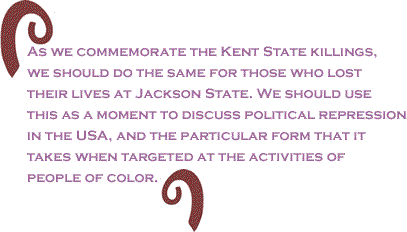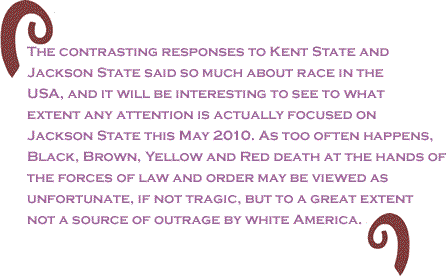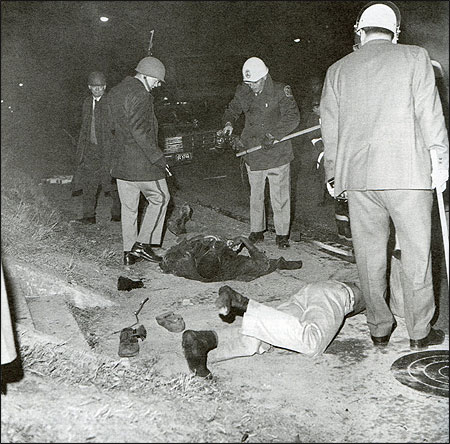There have been many commemorations this week of the killings at Kent State. Forty years ago student strikes were underway everywhere. Forty years ago last night, I was at a demonstration that trashed the ROTC building at the University of Kansas.
(Pictured here: Orangeburg, 1968)
Before Kent State was Orangeburg. After Kent State was Jackson State. Black students were killed at Orangeburg. Black students were killed at Jackson State. There was not a nationwide student strike. A few of us took notice of both, but since the students weren't white, well, the media and most others sort of yawned and said little.
Before Kent State was Orangeburg. After Kent State was Jackson State. Black students were killed at Orangeburg. Black students were killed at Jackson State. There was not a nationwide student strike. A few of us took notice of both, but since the students weren't white, well, the media and most others sort of yawned and said little.
The difference between the reactions to these three events is painful and it is racist. Bringing this up does nothing to disparage those killed at Kent State or the response to the killings. Bringing it up does point out how the racial divide in America divides pretty much everything...even the authorities gunning down students.
Kent State was a shock to America because white students weren't supposed to be the recipients of deadly force. That was supposed to be reserved for Black students, and Black Panthers...Blacks.
The murders at Orangeburg and the silence of most in reply helped set up the atmosphere that led to many more murders.
So while you are remembering Kent State...
REMEMBER ORANGEBURG...REMEMBER JACKSON STATE...
Kent State, Jackson State, Race and Resistance
by Bill Fletcher, Jr.
 | ||
2010 seems to be the year for anniversaries, and the killings that took place at Kent State University (Ohio) and two weeks later at Jackson State College (Mississippi) are two that will go down in infamy. It is difficult for me to forget May 1970. When word spread about the inexcusable murders of the anti-Vietnam War student protesters at Kent State, the USA just about exploded. As a high school activist at the time, discussions took place all afternoon when we heard about the killings leading me and another African American student to call a meeting for immediately after school to plan a response. That meeting and its aftermath taught me a great deal about activism. Let me set the stage. The meeting was chaired by me and the other African American activist. It was small, but diverse. Several white self-proclaimed anarchist students played a very disruptive role, challenging the fact that the meeting had any leadership. By the end of the meeting it was agreed that there would be a follow up meeting that evening at the home of one of the white students to develop more in depth plans. That evening I got to the meeting place on time only to discover that the meeting had already started and that plans were moving forward without my involvement or my co-chair from the earlier meeting. It was amazing in that the fact that we had called the earlier meeting was completely ignored, to the point that it was almost as if the earlier meeting had never happened. In any case, a plan was developed for a student strike and march on City Hall. This was successfully accomplished with the high school, for all intents and purposes, shut down. Our school joined with countless others across the country protesting the US invasion of Cambodia/Kampuchea and the killings at Kent State. The leadership of the march—of which I was not apart given the ‘coup’ that had taken place—had no plans for what should happen afterwards. We marched, rallied, and…then were sent home. A couple of weeks later word spread regarding the killings of two Black students at Jackson State College (now University). These students had been protesting the killings at Kent State, the Vietnam War and the racist harassment that Black students had been receiving. The police responded to the protest with bullets and the murder of two students, an act that was broadly condemned.  Yet, here is the punch-line: there were no massive student strikes. At my high school several Black student activists, most of us allied with the Black Panther Party, went throughout the school agitating for a walkout or, at least, a protest. Our cries met with little response. In my mind’s eye I can see one of our leaders addressing students in the cafeteria calling upon them to respond to these murders, only to be largely ignored. The lack of response to Jackson State was not isolated to my high school. While it was certainly the case that there were responses, none of it came close to mirroring the response to the Kent State killings. Much was made of this at the time, and then, as weeks became months, and months became years, Jackson State was largely forgotten. The contrasting responses to Kent State and Jackson State said so much about race in the USA, and it will be interesting to see to what extent any attention is actually focused on Jackson State this May 2010. As too often happens, Black, Brown, Yellow and Red death at the hands of the forces of law and order may be viewed as unfortunate, if not tragic, but to a great extent not a source of outrage by white America. The killings and woundings at Kent State were, simply put, not supposed to happen to good white students. That the shootings could never be properly explained by the authorities compounded the problem for the entire country. The murders at Jackson State, just as with the murders two years earlier at Orangeburg, South Carolina and two years later at Southern University in New Orleans, were the killings of faceless individuals who, in the minds of far too many white Americans, simply should not have placed themselves in harm’s way. What white America could largely not accept was that Kent State happened because the Orangeburg Massacre had been permitted to take place. The relative silence in the face of such a profound police injustice as was the Orangeburg Massacre of 1968 provided the grounding that made other such police atrocities possible. Inevitably that would spill over into white America. Yet, to the extent to which white America saw Kent State in isolation, it ignored it as part of a larger problem of police violence and state repression. To put it another way, the outrage against the killings at Kent State was quite sincere, but it was outrage within a bottle that saw in such an atrocity an aberration from a system that was largely fair and just. Thus, Jackson State was not seen as a continuation of state repression and police violence but more an example of the particular and peculiar forms of interaction that exist between Black America and the police in the USA, at least from the standpoint of too many white Americans, including otherwise liberal and progressive whites.  As we commemorate the Kent State killings, we should do the same for those who lost their lives at Jackson State. We should use this as a moment to discuss political repression in the USA, and the particular form that it takes when targeted at the activities of people of color. The frustration and dismay that I saw on the face of the Black student activist who appealed—in vain—to his fellow students in our high school cafeteria to walk out in protest over Jackson State goes to the split that exists in a broad progressive movement in the USA: a movement so necessary to take on corporate America and the political Right, yet a movement that can only do so to the extent to which it truly recognizes that an injury to one is an injury to all. As we commemorate the Kent State killings, we should do the same for those who lost their lives at Jackson State. We should use this as a moment to discuss political repression in the USA, and the particular form that it takes when targeted at the activities of people of color. The frustration and dismay that I saw on the face of the Black student activist who appealed—in vain—to his fellow students in our high school cafeteria to walk out in protest over Jackson State goes to the split that exists in a broad progressive movement in the USA: a movement so necessary to take on corporate America and the political Right, yet a movement that can only do so to the extent to which it truly recognizes that an injury to one is an injury to all.BlackCommentator.com Editorial Board member, Bill Fletcher, Jr., is a Senior Scholar with the Institute for Policy Studies, the immediate past president of TransAfrica Forum and co-author of, Solidarity Divided: The Crisis in Organized Labor and a New Path toward Social Justice (University of California Press), which examines the crisis of organized labor in the USA. Click here to contact Mr. Fletcher. |


No comments:
Post a Comment